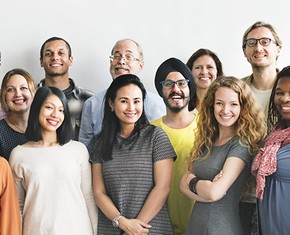The views expressed in our content reflect individual perspectives and do not represent the authoritative views of the Baha'i Faith.
From sexual harassment to the separation of families to mass shootings, our nation and our world is drowning in tears, and anger will only keep us afloat for so long.
We participate in protests and post passionate essays on Facebook. We take jobs in hyper-bureaucratic environments hoping that we can make a difference and shift the culture within an organization (because someone’s got to do it), until we run our optimism into a wall (or low ceiling).
The GDP of the 41 Heavily Indebted Poor Countries (567 million people) is less than the wealth of the world’s seven richest people combined. Forty million people in the United States (12% of the population) live at or below the poverty line. About 12 million women and girls across the U.S. between the ages of 12 and 52 live below the poverty line. Women represent only 24% of the members of the United States Congress, and women of color, just 9%.
Only 41% of people in the U.S. with a mental disorder in the past year received professional health care or other services. Halfway through 2019, at least eight school shootings have taken place.
From my point of view, and from a Baha’i perspective as well, we live in “the dark heart of an age of fundamental change:”
Our world has entered the dark heart of an age of fundamental change beyond anything in all of its tumultuous history. Its peoples, of whatever race, nation, or religion, are being challenged to subordinate all lesser loyalties and limiting identities to their oneness as citizens of a single planetary homeland. – The Universal House of Justice, from its introduction to Baha’u’llah’s Most Holy Book, p. 11.
To focus on changing our external environment can be daunting, perhaps even paralyzing, but we mustn’t overlook the impact of turning inward, examining the barriers within ourselves, the state of our own hearts, and beginning to ground ourselves before we start scaling walls.
Our external environment reflects the inner life of the spirit, and the transformation of society is inextricably linked with individual transformation. The Baha’i teachings say that little will change at the global level so long as nations stand arrogantly waving their own agendas in the air, and the pendulum won’t swing within our countries until we remove the prejudices that stain our hearts and plague the path to peace:
The third teaching of Baha’u’llah concerns universal peace among the nations, among the religions, among the races and native lands. He has declared that so long as prejudice—whether religious, racial, patriotic, political or sectarian—continues to exist among mankind, universal peace cannot become a reality in the world. – Abdu’l-Baha, The Promulgation of Universal Peace, p. 373.
Baha’is believe that we will not achieve a lasting global peace until we recognize the organic unity of all nations, the oneness of humanity, and the interdependence of all creation.
For too long, nations and peoples have created divisions, imposed rule, and asserted their independence, with no regard for collateral damage. In the United States, we celebrate Independence Day, and in our haste to find the best view of the July 4th fireworks, how many of us reflect on the costs of that independence and the genocide against the original inhabitants of the land? The reality of oneness means that we are in fact interdependent: injure one limb, and you affect the entire body.
Thus, oppression of the other to achieve or maintain independence for the privileged perpetuates the reason humanity as a whole suffers today. Humanity—not to mention the rest of creation—will continue to suffer until we treat the root cause of the pain: prejudice. The Baha’i prescription: the practice of oneness, not only as a principle, but as a daily set of focused actions.
As a child, I accepted the oneness of humanity as fact—a universal truth that was not universally acknowledged, yet was one of the fundamental verities of the Baha’i Faith that underpinned my belief system. But, like any truth, following the Baha’i principle of independent investigation expounded by Baha’u’llah, did I not have an obligation to search for it? To seek the reality of oneness?
Therefore, it is our duty in this radiant century to investigate the essentials of divine religion, seek the realities underlying the oneness of the world of humanity and discover the source of fellowship and agreement which will unite mankind in the heavenly bond of love. – Ibid., p. 144.
Seated in meditation, I connect to the light – a visualization technique that enables me to tune out the excesses of the material world and connect to Source, to Creator, to God. I am one with my Creator. In no way do I mean to imply that I am anything but a mere speck of dust, but rather that through prayer and supplication, and by the grace of God, I have the capacity to shine, for “His favors change a drop into an ocean, cause a seed to become a tree and make an atom as glorious as the sun.” – Ibid., p. 457.
As I let this light course through me, I am reminded that my soul was made in God’s image—that my heart is a mirror and I must strive to polish it in order to reflect the attributes of God, to reflect that light. I visualize the light expanding from within me to encompass the room, the city, the country, eventually reaching all creation. We are connected.
















Comments
Sign in or create an account
Continue with Googleor